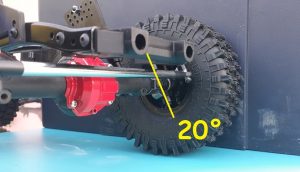Caster matters in RC Scalers and Crawlers
- staff
- Feb 17, 2024
- 2 min read
There are many angles in the steering box that are important to consider. This article focuses on the influence of Caster in RC Scalers and Crawlers.
Caster and its dynamic effects
Caster angle represents the angle between the steering axis and the vertical axis, when observed from the side view
Caster angle is "positive" when the upper pivot of the steering hub is behind the lower one. This setting is the standard nowadays, because grant more stability to the car when wheels are rolling
Static effects of positive caster
The stabilizing function of the Caster takes on a virtually irrelevant effect in scaler models, which are typically very slow
However, positive Caster introduces 2 effects that are far from minor and very useful in going through counter-slope turns, i.e., the condition in which the inner side of the turn is higher than the outside
#1 Additional support on the outer side wheel

Positive Caster shifts the footprint of the wheels to the outer side of the turn, providing additional ground clearance and containing rollover in counter-sloping curves.
#2 Unloading of the outer side of the wheel

Positive Caster also involves inclination of the wheels in relation to the vertical axis in the front view. This results in pressure decrease of the outer side of the wheel, containing tippin in counter-sloping turns.
Negative effects
Positive effects in counter-slope turns become negative in turns with concordant slope to steering. However, this condition is less severe because the centrifugal force balances the tendency to tilt. Finally, it should be considered that when the slope helps steering, there are other measures that can be taken to turn the model, such as steering shots without forward motion.
How to increase Caster
To increase caster, you can act by rotating the hub on the axle if the attachment allows to do, or use a different hub if available as optional part or aftermarket part.

When it is not possible to change the caster in the ways described, another option is to modify the length of the front links, shortening the upper ones and lengthening the lower of the same lenght to avoid changes in wheelbase.
In this case, however, the increase in caster will also increase the working angle of the transmission joint and its protrusion at the bottom, which are technical limitations that must be considered in advance.
Conclusions
So far we have learned that increasing caster in a crawler model is a modification that has benefits in severe conditions and disadvantages in more favorable conditions.
Our advice is to increase Caster using the methods available for your model, being careful not to exceed the limits of proper operation to protect the mechanical parts.
Have a good job!

